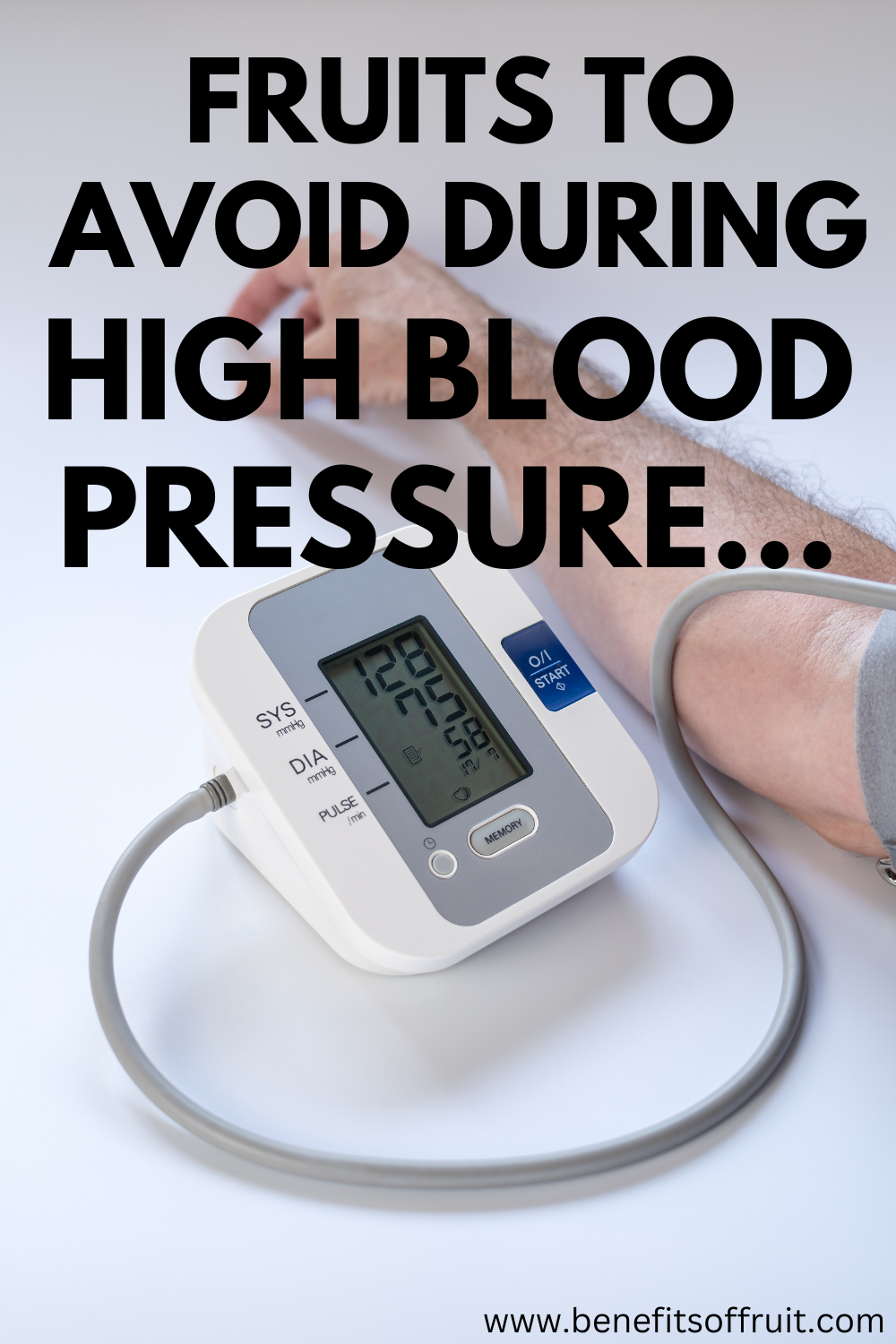High blood pressure, or hypertension, is often referred to as the “silent killer” because it frequently has no symptoms but can lead to serious cardiovascular complications like heart disease and stroke. According to the World Health Organization (WHO), over 1.13 billion people globally have high blood pressure. The management of hypertension is crucial, and diet plays a significant role in this. While fruits are generally considered healthy, some should be approached cautiously due to their potential impact on blood pressure. This article will delve into which fruits to avoid if you have high blood pressure and why.
Understanding the Connection Between Diet and Blood Pressure
Diet is crucial in regulating blood pressure due to the nutrients in the foods we consume. Sodium, potassium, and sugar are of particular importance regarding blood pressure:
- Sodium: Excessive sodium intake can lead to water retention, increasing blood volume and blood pressure.
- Potassium: This mineral helps regulate sodium levels, but its imbalance can affect blood pressure.
- Sugar: High sugar intake can contribute to obesity, which is a risk factor for hypertension.
Fruits, known for being nutrient-rich and low in calories, are a vital part of a heart-healthy diet. However, some fruits contain high levels of sodium, sugar, or other compounds that can negatively impact those with hypertension.
Fruits To Avoid During High Blood Pressure
Fruits High in Sodium
While fresh fruits generally have low sodium levels, some processed or preserved fruits can contain high amounts of sodium.
Olives: Though not a fruit in the traditional sense, olives are often overlooked in discussions about fruits and sodium. Canned or brined olives can be exceptionally high in sodium, sometimes containing up to 700 milligrams of sodium per 100 grams. This amount can significantly impact blood pressure, especially for those already struggling with hypertension.
Pickles: Pickled fruits like pickled mangoes and pickled plums often contain substantial sodium. The pickling process involves using brine, a high-salt solution, as a preservative. Excess sodium intake from these pickled fruits can exacerbate high blood pressure.
Fruits High in Natural Sugars
Natural sugars, while less harmful than added sugars, can still be problematic when consumed excessively, especially in concentrated forms.
Dried Fruits (Raisins, Apricots): Dried fruits are naturally high in sugar due to the dehydration process that removes water and concentrates the fruit’s natural sugars. For example, a cup of raisins can contain over 85 grams of sugar. This concentrated sugar can lead to weight gain, a risk factor for hypertension.
Fruit Juices: Fruit juices often have a high sugar content, even without added sugars. Orange juice, for instance, has around 21 grams of sugar per cup. Frequent consumption of fruit juices can contribute to excessive sugar intake, potentially leading to weight gain and increased blood pressure.
Citrus Fruits
Grapefruit: Grapefruit and grapefruit juice can interfere with certain medications used to treat high blood pressure, such as calcium channel blockers. The compounds in grapefruit inhibit an enzyme in the liver responsible for breaking down these drugs, potentially leading to dangerously high drug levels in the bloodstream. This interaction can result in excessively low blood pressure, dizziness, and even fainting.
Canned Fruits
Canned fruits are often preserved in sugary syrups or contain added sugars and preservatives.
High Syrup Content: Many canned fruits are packaged in heavy syrup, adding unnecessary sugar to a typically healthy fruit. A cup of canned peaches in heavy syrup can contain over 30 grams of sugar, significantly impacting blood sugar and blood pressure when consumed in excess.
Fruits With Added Sugars
Candied Fruits: Candied fruits, such as candied pineapple or cherries, are fruits coated in sugar syrup and dried. They have a very high sugar content, with around 50-60 grams of sugar per 100 grams of fruit. This high sugar content can lead to weight gain and increase the risk of high blood pressure.
Fruits that May Cause Bloating or Gas
Certain fruits can cause bloating and gas, potentially contributing to discomfort and indirectly affecting blood pressure.
Bananas: Bananas are rich in potassium, an essential mineral that helps balance sodium levels. However, for those on certain blood pressure medications, such as ACE inhibitors or potassium-sparing diuretics, excess potassium intake can be problematic. It can lead to hyperkalemia, which can cause heart arrhythmias and other cardiovascular issues.
Watermelon: Watermelon contains high water content, which can be beneficial for hydration. However, excessive consumption could disrupt nutrient balance due to its high potassium content, affecting those with compromised kidney function, which is sometimes related to hypertension.
Conclusion
Dietary modifications are crucial for managing high blood pressure, and understanding which fruits to avoid is an essential part of this. While fruits are generally beneficial for health, certain types should be consumed with caution or avoided altogether due to their high sodium, sugar, or specific nutrient content. Olives, pickled fruits, dried fruits, fruit juices, and certain citrus fruits like grapefruit can pose challenges for those with high blood pressure. Additionally, canned and candied fruits should be consumed sparingly due to their added sugars, and caution should be exercised with fruits like bananas and watermelon, particularly for those on specific medications.
